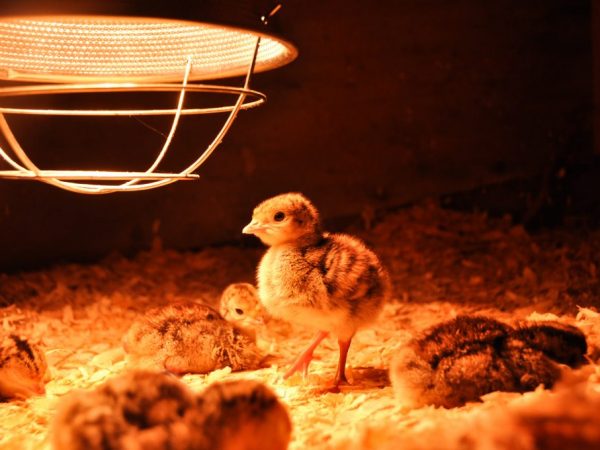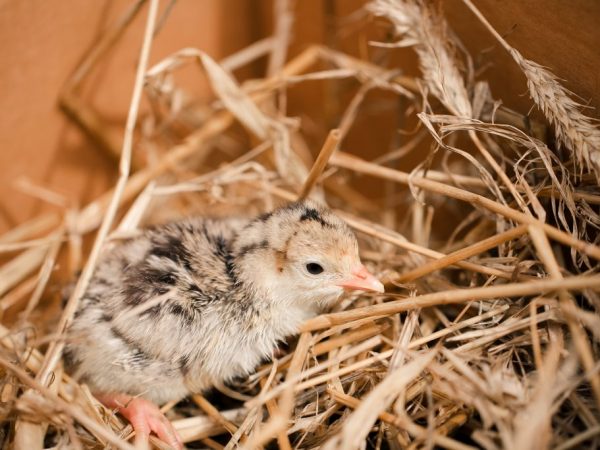Care for daily turkey poults
Successful breeding of any living creature requires some skills and abilities from the farmer. A person should know how to take care of young animals, organize them a living room, and so on. Today many people prefer turkey meat to chicken. If you are interested in daily turkey poults, you can buy them in a specialized store, and in the future everything will depend on how much, the breeder is well trained and knowledgeable.

Care for daily turkey poults
Conditions
The chick in the first day of life needs special care. Several points need to be thoroughly studied:
- arrangement of the premises;
- room microclimate;
- illuminations;
- feeding;
- diet.
Turkey poults should be warmed up on the first day. After the chicks are dry, they should receive their first food and water. You need to carefully select the diet in order to avoid irreparable mistakes. Newborn birds need a sufficient amount of balanced food.
Indoor microclimate
The daily turkey needs to be heated. Unlike other poultry, they do not have innate thermoregulation and therefore need additional heating. A thermometer must be placed in the room for chicks, so that the breeder can control and regulate the temperature regime.
For the entire first week, the room temperature should be maintained at 35 degrees. Every week, the temperature is gradually reduced by 3-5 degrees. Ultimately, the room temperature will be 20 degrees.
If the birds lack warmth, the breeder can tell by their behavior. The kids begin to huddle together and beep constantly. When the poults are heavy, breathing intermittently, their beaks are constantly opening - this is a signal that it is too hot in the room and the temperature regime needs to be adjusted.
Illuminations
For full development, chicks need round-the-clock illumination. If the room is dark, the chicks will become disoriented, bump into each other and walls, which will lead to injuries. At this point, there is still no consensus on the timing of the round-the-clock glow in the room.
Some breeders believe that round-the-clock illumination is necessary for chicks for 1.5 months. Other farmers cut their daylight hours every day by half an hour. As a result, on the twentieth day, the chicks shine for 15 hours.
Selection of illumination and setting of daylight hours, a purely individual lesson. The farmer must first of all look at the condition of his chicks. Under normal temperature conditions and sufficient illumination of the turkey poults:
- calm, active;
- sleep separately or in small groups;
- do not emit a loud squeak.
Room equipment
The first day of life in turkeys is spent in a box. It can be a simple cardboard box. You can fasten two boxes together to increase the area. Stocking density per 10 square centimeters 1 turkey. The height of the walls must be at least 30 cm.
Perfect option - keeping chicks in a brooder... Buy it in a store or make it yourself. The advantages of a brooder are that, unlike a regular box, the required temperature and humidity are maintained in it. Another advantage is the mesh flooring, which greatly facilitates the hygiene of the box.
If, there is no way to get it, there is no brooder, you can get by with a box. It is important not to forget about the floor covering. In the box, you can put cotton diapers on the floor, make a mound of sawdust or hay. It is best to make the floor by laying out the layers one by one:
- oilcloth;
- newspapers;
- directly litter.
How to feed and drink?
One day old turkey poults should have sufficient drinking water. On the first day, they do not eat food, but only drink liquid. Water should only be boiled. Many farmers who have been breeding birds for a long time add to their drink in the first 5 days antibacterial drugs, it may even be commonplace manganese. All kinds of biostimulants are often used, which contain all the necessary vitamins and antibiotics. One of these drugs is biovit. Sometimes vitamin C and sugar (a tablespoon per liter of water) are put into the water of the chicks.

You need to water turkey poults with boiled water.
The chicks are very poorly oriented in space, therefore, in the first three days, they should install white dishes for drinking and eating. It is necessary to arrange feeders and drinkers in the optimal amount. With a lack of plates, the weakest individuals will receive less food, as a result of their displacement by stronger chicks.
In addition to a proper balanced diet, diet also plays an important role. Feed the chicks in the first 10 days up to 9 times. From a month, they begin to reduce the number of feedings up to 6 times. Already at the age of two months, food is given 4 times. Reduce feedings gradually, it is advisable to initially plant chicks on an hourly basis, then in the future, reducing feedings will not be a problem.
Nutrition - how it should be
Turkey poults eat the same way as chickens. It is best to choose balanced compound feed... In the first days of life, the chicks are given a hard-boiled chicken egg, together with the shell. The diet should contain, for the most part, foods containing calcium and protein. In the first days of life, cottage cheese, onion leaves, nettles, boiled carrots are added to the diet.
All products are chopped or finely chopped. For accelerated growth, they practice the introduction of vitamin mixes, which include corn and meat and bone meal, chalk, eggs, cottage cheese, bran. The consistency should be crumbly and slightly damp, but in no case should the food stick together. To slightly moisten a too dry composition, you can use sour milk or yogurt, ordinary milk cannot be used.
Onion and garlic leaves are produced only during the daytime. Juicy greens are added to any feeding. It is permissible to pour sour milk into a separate drinking bowl. Farmers often use the Start compound feed for feeding young animals. However, before using starter feed, you need to go to the veterinarian for a consultation and read the instructions carefully.
To be able to provide proper care for chicks, you need to know the features of the digestive tract. In a day-old turkey, the intestines are much larger in size. than in an adult bird. Based on this, it turns out that the chick has food in the intestines longer than the adult. This means that chicks should only eat perfectly selected feed. The following should be excluded from the diet of babies:
- straw;
- hay;
- stale mash;
- dirty water.
What are they sick with?
Every Farmer Should Know Everything about diseases of young animals... Very often, growth problems are provoked by improper care, poor quality feed or infectious diseases that turkeys are often exposed to. The first alarm bell is - loose stools, discoloration of droppings, anxiety. These signals cannot be ignored.
First of all, sick chicks are selected and placed in another box. The remaining chicks are also transplanted into another clean tray. Sick individuals are not given food for a day. The main thing is to provide free access to water with manganese. They should be given sulfadimezin or chloramphenicol.
You should not self-medicate, especially if there is not so much experience in such matters. It is best to consult an experienced doctor. Often the owners themselves are to blame for not providing the proper conditions. A widespread infection can be caused by wet, dirty bedding, overheating or hypothermia, frequent stress, improper diet, stale water. All this can even lead to death.
It is very important to have a weekly check-up and seek help if any suspicious signs are found. For example, if the birds shake their heads, this can be a symptom of a serious illness that causes mortality in 50% of cases and is almost impossible to treat. It is very important to carry out deworming and vaccinate chicks on time.
Final part
Growing turkeys is a fairly lucrative branch of agriculture. For a good start, it is necessary to study the behavior, structural features and care of turkeys at one day of age. This will allow you to get healthy offspring, which will delight the owner with high production rates.
Chicks are born completely unadapted to environmental conditions, do not know how to eat on their own, therefore they need special care. At first, the chicks need to be constantly illuminated, because they do not orient themselves in space and will not be able to find feeders and drinkers. Also, the breeder will have to teach the chicks to peck food from the feeders on their own.
To drink in the first five days, the chicks are given a weak solution of potassium permanganate. This is an excellent prevention of gastrointestinal tract diseases and infectious diseases. It is important to remember that chicks have a much larger intestine than an adult turkey, and therefore food stays there longer.
The paramount point in keeping young animals is the hygiene of the premises in which they are kept. The litter should always be clean and dry, otherwise the chicks can get sick and even die. For the most part, babies get sick due to the fault of the breeders themselves, who cannot provide proper care and feeding. The most important thing to remember is that at first the turkeys are not at all independent, they see poorly and need care. It is at this moment that the laying of immunity occurs, so with a little work at the beginning, the breeder will get an excellent result.


